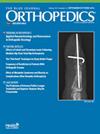Treatment of Kienböck's Disease Using Fourth and Fifth Extensor Compartmental Artery Vascularized Bone Grafts.
IF 1.2
4区 医学
Q3 ORTHOPEDICS
引用次数: 0
Abstract
BACKGROUND This study evaluated the radiological and clinical outcomes of bone grafts using fourth and fifth extensor compartmental arteries (4+5 ECAs) for the treatment of Kienböck's disease. MATERIALS AND METHODS In total, 21 patients (12 men and 9 women; mean age, 41 years; range, 19-59 years) were followed for a mean of 33 months. Radiological images were analyzed for the Lichtman stage, carpal height ratio, radioscaphoid angle, and Stahl's index. Clinical evaluation included range of motion, visual analog scale (VAS) score, grip strength, modified Mayo wrist score (MMWS), Lichtman outcome score, and Disabilities of the Arm, Shoulder and Hand (DASH) score. At the time of surgery, 6, 14, and 1 patients had Lichtman stages II, IIIA, and IIIB, respectively. RESULTS At the final follow-up visit, grip strength had improved from 65.4% to 79.7%, wrist extension had improved from 43° to 57°, and flexion had improved from 42° to 50°. There were no significant changes in the carpal height ratio, Stahl's index, or radioscaphoid angle. The mean VAS score was 1.7, and the mean DASH score was 6.9. The mean MMWS was 87.9, with excellent and good outcomes in 6 and 11 patients, respectively. Satisfactory Lichtman outcome scores were observed in 81%. Body mass index had a strong correlation and age had a weak correlation with MMWS (coefficient=-0.534, P=.013, and coefficient=-0.393, P=.078, respectively). CONCLUSION The 4+5 ECA bone graft is effective for the treatment of Kienböck's disease in young patients with low body mass index. [Orthopedics. 202x;4x(x)xx-xx.].使用第四和第五伸肌室动脉血管化骨移植治疗基恩博克病
背景本研究评估了使用第四和第五伸肌室动脉(4+5 ECA)植骨治疗 Kienböck 病的放射学和临床效果。材料和方法共对 21 名患者(12 名男性和 9 名女性;平均年龄 41 岁;范围 19-59 岁)进行了平均 33 个月的随访。对放射影像进行了分析,包括利希特曼分期、腕高比、桡骨角和斯塔尔指数。临床评估包括活动范围、视觉模拟量表(VAS)评分、握力、改良梅奥腕关节评分(MMWS)、Lichtman结果评分以及手臂、肩部和手部残疾(DASH)评分。结果在最后一次随访时,握力从 65.4% 提高到 79.7%,腕关节伸展从 43° 提高到 57°,屈曲从 42° 提高到 50°。腕高比、Stahl 指数或桡侧肩胛角均无明显变化。VAS 评分的平均值为 1.7,DASH 评分的平均值为 6.9。MMWS的平均值为87.9分,分别有6名和11名患者的疗效为优和良。81%的患者获得了满意的 Lichtman 结果评分。体质指数与 MMWS 的相关性较强,而年龄与 MMWS 的相关性较弱(分别为系数=-0.534,P=.013 和系数=-0.393,P=.078)。[骨科。202x;4x(x)xx-xx]。
本文章由计算机程序翻译,如有差异,请以英文原文为准。
求助全文
约1分钟内获得全文
求助全文
来源期刊

Orthopedics
医学-整形外科
CiteScore
2.20
自引率
0.00%
发文量
160
审稿时长
3 months
期刊介绍:
For over 40 years, Orthopedics, a bimonthly peer-reviewed journal, has been the preferred choice of orthopedic surgeons for clinically relevant information on all aspects of adult and pediatric orthopedic surgery and treatment. Edited by Robert D''Ambrosia, MD, Chairman of the Department of Orthopedics at the University of Colorado, Denver, and former President of the American Academy of Orthopaedic Surgeons, as well as an Editorial Board of over 100 international orthopedists, Orthopedics is the source to turn to for guidance in your practice.
The journal offers access to current articles, as well as several years of archived content. Highlights also include Blue Ribbon articles published full text in print and online, as well as Tips & Techniques posted with every issue.
 求助内容:
求助内容: 应助结果提醒方式:
应助结果提醒方式:


